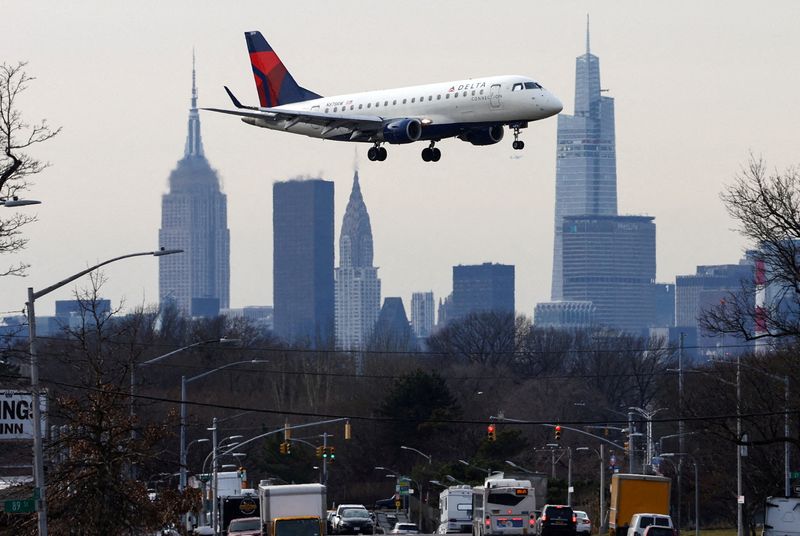By Rajesh Kumar Singh
CHICAGO (Reuters) - Shifting travel patterns by consumers in a post-pandemic world are forcing airlines to guess at what is the "new normal" as they seek to adjust by cutting flights, revamping networks and packing even more passengers into planes.
Even as the thirst for travel remains strong, the changing trends are driving up airlines' operating costs and hurting revenue.
They are also fueling worries about the strength of travel spending amid growing economic uncertainty, leading to a 6% drop in airline shares from their highs in January.
"Today's flexible work conditions are helping to drive changes in ticket-purchasing patterns." Citi analyst Stephen Trent said. "Let's get used to it."
No-show rates have gone up as customers are changing their travel plans more frequently than before.
Travel demand has also softened on days in the middle of the week, but has strengthened on peak days. A Reuters analysis of U.S. Transportation Security Administration data shows passenger traffic this year on average has fallen 14% on Tuesdays and Wednesdays compared with Mondays, and then it rebounds on Thursdays.
Similarly, customers are booking trips well in advance compared with last year, leading to a moderation in ticket sales close to the date of travel. Citi's data shows that these so-called close-in ticket sales have moderated for a third straight week, but those for trips in June and July have improved.
Those evolving patterns have forced companies to adjust.
Frontier Airlines decided to slash flights on Tuesdays and Wednesdays by about 20%, citing weak demand. It marks a shift from last year when some airlines said midweek was less of a trough.
The Denver-based carrier attributed the change to flexible work arrangements, where more people are spending two to three days a week working in the office.
"The most common two days in the office are Tuesdays and Wednesdays," said Daniel Shurz, a senior vice president at Frontier Airlines. "That's why travel for leisure is the hardest on Tuesdays and Wednesdays."
In contrast, the ultra-low-cost carrier last week said its revenue per available seat mile on peak travel days is stronger than before the pandemic as customers are willing to pay a lot more to travel on the other days of the week.
Frontier has eliminated an unspecified number of routes as part of its network restructuring. It now expects capacity this year to be up 19%-22% from last year compared with previously estimated growth of 23%-28%, resulting in higher operating costs.
Changing travel patterns are also affecting United Airlines, which has a relatively small presence in the Caribbean and Florida where demand is usually strong in the winter.
Since the Chicago-based carrier's network is more focused on business traffic, which has not fully recovered to pre-pandemic levels, its revenue suffered in the last quarter. United last month said it wants to expand its Florida network.
"We believe demand is just structurally different than it was pre-pandemic," CEO Scott Kirby (NYSE:KEX) said. "We're still figuring out that new normal."
BUMPING AND OVERBOOKING
Airlines are also seeing a change in ticket sales.
Passengers are booking flights earlier than they did through much of the pandemic, when travel restrictions and health concerns made planning in advance difficult.
United said bookings for trips within 21 days are weaker than those beyond 21 days. Delta Airlines reported that bookings for trips inside 30 days were declining, while those outside 30 days were stronger.
Carriers did not share comparative data for last year, but Southwest Airlines (NYSE:LUV) Co said bookings for trips closer to the departure date have weakened compared to last summer.
Delta Air Lines Inc (NYSE:DAL) CEO Ed Bastian ascribed it to an attempt on the part of customers to lock in the opportunity to travel sooner as well as elimination of flight change fees by many airlines.
It is having a cooling effect on domestic airfares.
Data from online travel agency Hopper showed average domestic round-trip airfare declined 15% to $285 in April from last year.
While the fare data has stoked concerns about consumer demand, Hopper's lead economist, Hayley Berg, said overall spending on travel has gone up.
The waving of change fees, meanwhile, is encouraging people to revise plans at the last minute, affecting the proportion of seats sold, known within the industry as passenger load factor. Delta's load factor in the March quarter dropped by 4 percentage points from a quarter ago.
To tackle this problem, Delta has said it now plans to overbook flights even more. The company declined to share its plans.
The move runs the risk of bumping more passengers off flights.
Last year, it denied boarding to more customers than American Airlines (NASDAQ:AAL) and United, U.S. Transportation Department data shows. However, except for two passengers, all the travelers voluntarily agreed to be paid to change their flights.
"We had a lot of stability pre-pandemic," Delta President Glen Hauenstein said. "We're adjusting here into what I would call a new normal."
